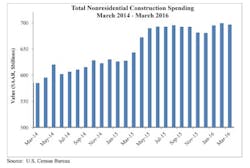Latest from Management
How to Scale Your Business
Sponsored
Nonresidential construction spending slips in March
WASHINGTON, DC — Nonresidential construction spending fell 0.4 percent on a monthly basis in March, according to analysis of U.S. Census Bureau data released today by Associated Builders and Contractors (ABC), but it was up 8.3 percent on a year-over-year basis to $695.7 billion. Eight of 16 nonresidential construction subsectors experienced monthly spending growth in March and twelve are up on a year-ago basis.
March would have recorded a monthly spending gain were it not for an upward revision to February's data (from $690.3 to $698.4 billion).
"Viewed optimistically, one can conclude that nonresidential construction has stabilized at a high level," said ABC Chief Economist Anirban Basu. "While the last several months have failed to deliver significant spending growth, many contractors indicate that they remain busy and that backlog levels are satisfactory. Still, one might have expected better spending growth performance given the combination of steady job growth nationally, large sums of capital coming from abroad and invested in the U.S. and surprisingly low interest rates.
"Based on recent trends, one concludes that many U.S. corporations remain reluctant to invest in large-scale projects," said Basu. "Nonresidential fixed investment has generally been soft over recent quarters, and has subtracted from GDP growth recently. America has been experiencing a corporate profits recession recently and slow growth. GDP expanded less than 2 percent on an annualized basis during last year's final quarter and less than 1 percent during this year's first. Combine that with hesitant government agencies, and one lacks a recipe for healthy nonresidential construction spending growth."
Spending has increased in 12 of the 16 construction subsectors over the past year. Three of the four sectors registering spending declines over that time — water supply, conservation and development, and public safety — rank among the four smallest subsectors. Each of these subsectors is also heavily influenced by public sector capital budgets.
- Lodging-related spending was up 1 percent from February 2016 and is up 27.7 percent from March 2015;
- Health care-related spending expanded 1.6 percent month-over-month and is up 4.1 percent year-over-year;
- Commercial-related construction spending rose 1.2 percent for the month and 14.5 percent over the last year;
- Conservation and development-related spending was 1.6 percent higher on a monthly basis, but is 3.3 percent lower on a year-over-year basis.
- Spending in the religious category grew 5.2 percent for the month and is up 6.4 percent from March 2015.
- Manufacturing-related spending gained 2 percent on a monthly basis, but is down 2.1 percent on a year-over-year basis.
- Communication-related spending grew 3.7 percent month-over-month and has expanded 10.4 percent year-over-year.
- Spending in the highway and street category expanded 0.5 percent from February and is 18.8 higher than one year ago.
Spending in eight of the nonresidential construction subsectors fell in March on a monthly basis:
- Spending in the amusement and recreation category fell 1 percent from February, but is up 9.6 percent from the same month one year ago.
- Education-related construction spending fell 0.6 percent on a monthly basis, but has expanded 11.8 percent on a yearly basis.
- Sewage and waste disposal-related spending fell 4.2 percent for the month, but is up 3.8 percent from the same time one year ago.
- Spending in the power category was down 3.2 percent from February, but is up 0.8 percent from a year ago.
- Water supply-related spending fell 1.6 percent on a monthly basis and has declined 6.1 percent on a yearly basis.
- Spending in the office category declined 1.3 percent from February, but is up 19.5 percent on a year-ago basis.
- Transportation-related spending fell 2.1 percent month-over-month and has expanded 1.2 percent year-over-year.
- Public safety-related spending is down 7.8 percent for the month and 12.3 percent from March 2015.



